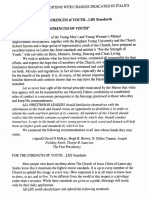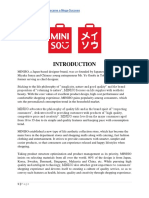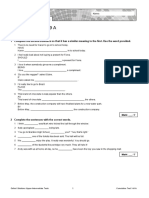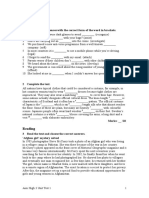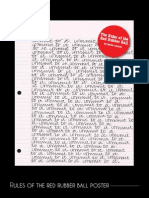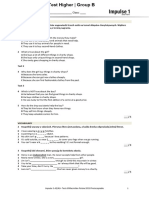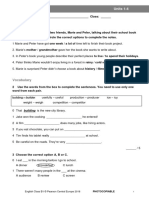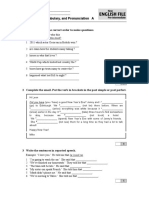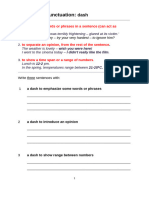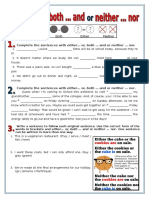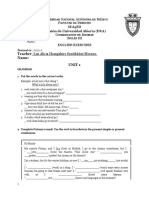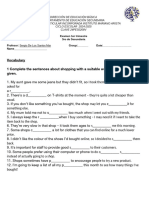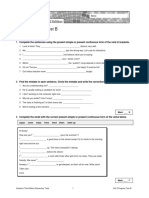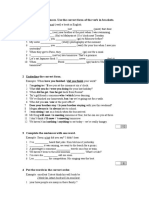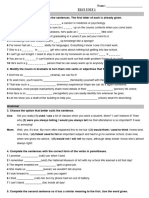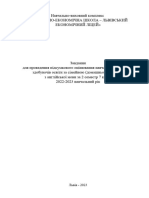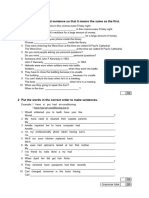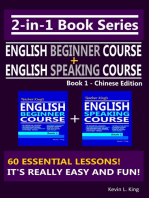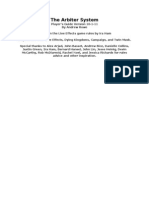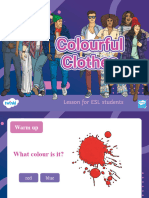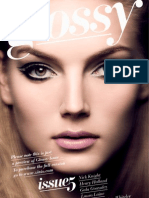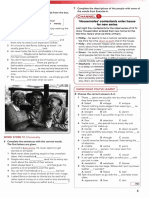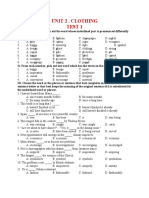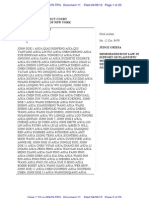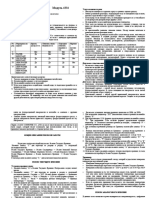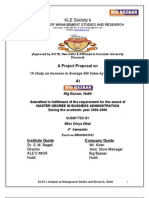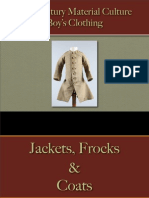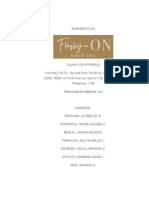Unit 8 Test Higher A
Unit 8 Test Higher A
Uploaded by
ewaryst79Copyright:
Available Formats
Unit 8 Test Higher A
Unit 8 Test Higher A
Uploaded by
ewaryst79Copyright
Available Formats
Share this document
Did you find this document useful?
Is this content inappropriate?
Copyright:
Available Formats
Unit 8 Test Higher A
Unit 8 Test Higher A
Uploaded by
ewaryst79Copyright:
Available Formats
Unit 8 Test Higher | Group A
Name: _____________________ Class: ____
LISTENING
1 Track 14 Usłyszysz dwukrotnie wypowiedzi trzech osób na temat sklepów charytatywnych. Wybierz
właściwą odpowiedź, zgodną z treścią nagrania.
Text 1
1 How do charity shops use the money they make?
A They use it to buy second-hand items.
B They donate it to people who need help.
C They give money to people who support charities.
2 What is NOT the reason why the girl buys things in charity shops?
A She can find things there that are also popular in other shops.
B She can spend less money on things she buys.
C She likes the feeling that she can help other people.
Text 2
3 What kind of clothes does the girl like?
A She likes modern fashionable styles.
B She likes fashionable styles from the past.
C She likes plain dresses.
4 How does she keep up to date with her charity shop?
A She goes there regularly.
B Her friends follow the shop on social media.
C She uses the internet to get information.
Text 3
5 What does the boy say about looking for books and comics in charity shops?
A That you might find surprising things.
B That you need to spend a lot of time looking.
C That you can always find valuable comics there.
___ / 5
VOCABULARY
2 Uzupełnij wyrazy w zdaniach. Pierwsza litera jest podana, a każda kreska odpowiada jednej literze.
0 I love wearing c a s u a l clothes.
1 This jumper is made of w _ _ _.
2 You have to wear a s _ _ _ to the wedding.
3 A football is a r _ _ _ _ object.
4 It’s really cold, so if you want to wear a skirt, you have to wear t _ _ _ _ _.
___ / 4
3 Uzupełnij luki słowami, które pasują do kontekstu zdania.
0 Henry is an independent man. He never accepts help from other people.
1 Larry believes he’s the best. He’s really ____________________.
2 Judy has never told a lie. She’s the most ____________________ person I know.
3 My mother is really ____________________. She always gives money to poor people.
4 What can I do to make you smile? You’re always so ____________________!
5 Do you know that Mary tried bungee-jumping! She’s a ____________________ woman.
___ / 5
Impulse 1 A2/A2+ Tests ©Macmillan Polska 2021 Photocopiable 1
GRAMMAR
4 Uzupełnij zdania odpowiednią formą czasownika podanego w nawiasie w czasie Present Perfect lub
Past Simple.
0 I have always wanted (always / want) to travel around the world.
1 She ____________________ (go) to Mexico last year.
2 Lucy ____________________ (not / wear) a miniskirt before.
3 I ____________________ (see) this film twice.
4 ____________________ you ____________________ (visit) the Acropolis when you were in Greece?
5 His basketball team ____________________ (never / win) the school competition.
___ / 5
5 Ułóż pytania o podkreślone informacje.
0 I sent a letter yesterday.
What did you send yesterday?
1 My friends have lost the gloves.
________________________________________
2 Mary is going to take part in the competition.
________________________________________
3 I invited my colleagues to the wedding.
________________________________________
4 My father does the cooking in my family.
________________________________________
___ / 4
USE OF ENGLISH
6 Przetłumacz fragmenty zdań podane w nawiasach na język angielski.
0 It is not necessary (nie jest konieczne) to wear a raincoat.
1 My mother has a lot of ____________________ (długich szalików).
2 I always ____________________ (nosiłam wygodne tenisówki) when I was a kid.
3 ____________________ (Kto nauczył cię) to knit?
4 Liam ____________________ (nigdy nie był w) the USA.
5 ____________________ (Z kim poszedłeś) to a fashion show with?
___ / 5
READING
7 Przeczytaj tekst. Wybierz właściwą odpowiedź, zgodnie z treścią tekstu.
Special objects
I believe that everyone has got an object that is close to their heart. What makes those things special is not
the object itself, its price, or its appearance, but the emotions they bring. No wonder such things usually tell
a story – about an event that is important to us, about people we associate with it, or about a place we have
visited.
My special object is my blanket; my grandma made it for me from clothes that I wore when I was little. She
took my old clothes and cut small squares of material from them and joined them together to make this lovely
patterned blanket. It’s nice and soft, and I have it on my bed; I think I’m really lucky, it took a long time
for Grandma to make this for me. I’ve had it for 2 years and still whenever I’m cold, I cover myself with it
and I feel really warm – not only because the blanket is so warm, but because it reminds me of a person who
really loves me. I can say I feel warm on the inside, as well!
My brother’s favourite thing is his first set of drumsticks. He’s played the drums since he was seven years old,
and sometimes I think this is something that he can’t live without. His drumsticks are light and comfortable
to hold, and he used them when he first started playing. Of course he’s got some bigger ones now, but he still
keeps the old ones, because they remind him of his first attempts (not perfect, by the way) to play the drums.
Fortunately, now he plays really well, but it’s so noisy that I’m happy that he plays the drums in the garage!
Impulse 1 A2/A2+ Tests ©Macmillan Polska 2021 Photocopiable 2
My father’s special object is a small stone which he found on a beach in Ireland when we went there for
a family holiday. It’s special because you can see an ancient sea snail preserved in it. It’s a hard, round stone,
and in the middle, you can see the marks of the sea snail. He’s really fond of it because it reminds him
of a really enjoyable time that we spent there. We’ve been to a lot of other places but the holiday in Ireland
is his favourite one.
My mother’s object is quite unusual because it’s a medal – and not for first place! She has always been athletic,
and she started running when she was eight years old. She competed for her school a few times, but she never
came first. Once she came third and she got this medal. It’s a small, round medal, not very heavy, and it’s plain,
without any inscription. She says that it’s really special for her because it’s not important if you are the best
or not; what really matters is that you do what you love and you never give up. She will probably never win
a race, but for me it’s a great lesson that you should be satisfied with your life and with what you do.
Ofcourse, you should always try to be better, but winning is not the most important thing in life. Sometimes
the enjoyment you feel about something is what really matters.
And what’s your special object? What story does it tell?
1 Why do people keep special objects?
A Because they are expensive.
B Because they remind us of stories we heard.
C Because they look cool.
D Because they remind us of certain people or places.
2 How long did it take for James’s grandma to make the blanket?
A His grandma didn’t spend much time making it.
B His grandma spent a lot of time making it.
C His grandma made it very quickly.
D His grandma spent two years on it.
3 How are James’s brother’s old drumsticks different from the ones he uses now?
A They are bigger.
B They are less comfortable.
C They are a different size.
D They are heavier.
4 Why does James's father like the stone?
A Because Ireland is his favourite country.
B Because it makes him think of a great time with his family.
C Because he likes the beach where he found it.
D Because it has got marks of a snail.
5 What is true about James’s mother’s medal?
A She got it for third place in a run.
B It’s round and heavy.
C She’s had it since she was eight.
D It’s got her name on it.
___ / 5
Impulse 1 A2/A2+ Tests ©Macmillan Polska 2021 Photocopiable 3
SPEAKING
8 Uzupełnij luki jednym wyrazem.
Tom: 0 Excuse me. I think I 1 ____________________ my water bottle here. Have you seen it?
Sue: I don’t think so. Where did you 2 ____________________ it?
Tom: On the bench, I was just here five minutes ago.
Sue: What does it 3 ____________________ like?
Tom: It’s a medium-sized, heavy bottle.
Sue: OK, what is it 4 ____________________ of?
Tom: It’s metal.
Sue: What 5 ____________________ is it?
Tom: It’s purple.
Sue: Let me see. Is this it?
Tom: Yes, it is. Thank you!
___ / 5
WRITING
9 Po powrocie od kolegi/koleżanki z Londynu, zauważyłeś/zauważyłaś, że przypadkiem zabrałeś/zabrałaś
jedną jego/jej rzecz. W e-mailu do kolegi/koleżanki:
– podziękuj za wspólnie spędzony czas,
– napisz, co przypadkiem zabrałeś/zabrałaś, i opisz ten przedmiot,
– wyjaśnij, jak to się stało,
– zapytaj, czy potrzebuje tej rzeczy w tym momencie i jak możesz ją zwrócić.
Użyj 100–150 słów, nie wliczając w to wyrazów już podanych.
Hi!
Just to let you know, …
___________________________________________________________________________________________
___________________________________________________________________________________________
___________________________________________________________________________________________
___________________________________________________________________________________________
___________________________________________________________________________________________
___________________________________________________________________________________________
___________________________________________________________________________________________
___________________________________________________________________________________________
___________________________________________________________________________________________
___________________________________________________________________________________________
___________________________________________________________________________________________
___________________________________________________________________________________________
See you soon,
XYZ
___ / 12
TOTAL SCORE: ___ / 50
Impulse 1 A2/A2+ Tests ©Macmillan Polska 2021 Photocopiable 4
You might also like
- 1960s Versions Text of The For The Strength of YouthDocument6 pages1960s Versions Text of The For The Strength of YouthPizzaCow100% (1)
- Unit 3 Progress Test A: GrammarDocument6 pagesUnit 3 Progress Test A: GrammarAnastasia Guidoti86% (7)
- A2 Final TestDocument7 pagesA2 Final TestSanja100% (2)
- Test On Unit 1 Matura Focus 2ND EditionDocument6 pagesTest On Unit 1 Matura Focus 2ND EditionKacper Stosel100% (1)
- Case Study - MinisoDocument5 pagesCase Study - MinisoSania NisarNo ratings yet
- Cumulative Test 1-9 ADocument5 pagesCumulative Test 1-9 AKamila Ostrowska100% (4)
- Aim High TB3 Test 1Document4 pagesAim High TB3 Test 1hodaNo ratings yet
- The Rules of The Red Rubber BallDocument16 pagesThe Rules of The Red Rubber Ballapi-25817757No ratings yet
- Executive Summary & Product OverviewDocument5 pagesExecutive Summary & Product OverviewArnea Joy TajoneraNo ratings yet
- The Effects of Korean Fashion To The Filipino YouthDocument6 pagesThe Effects of Korean Fashion To The Filipino YouthJaneth MarcelinoNo ratings yet
- Astrid CaneDocument80 pagesAstrid Canenewguyat7750% (2)
- Unit 8 Test Higher BDocument4 pagesUnit 8 Test Higher Bewaryst79No ratings yet
- Unit 8 Test Standard ADocument4 pagesUnit 8 Test Standard Aewaryst79No ratings yet
- Unit 8 Test Standard BDocument4 pagesUnit 8 Test Standard Bewaryst79No ratings yet
- ECB1 - Tests - Mid-Year Test C - New 2018Document5 pagesECB1 - Tests - Mid-Year Test C - New 2018DorotaNo ratings yet
- PDF‑документ PDFDocument3 pagesPDF‑документ PDFПолина ЗайковаNo ratings yet
- ECB1 Tests Language Test 7B New2018Document4 pagesECB1 Tests Language Test 7B New2018Tommy LyNo ratings yet
- EC - A2 - Tests - Mid-Year Test 1-4 BDocument4 pagesEC - A2 - Tests - Mid-Year Test 1-4 Bluk001No ratings yet
- ECB1 - Tests - Mid-Year Test A - New 2018Document5 pagesECB1 - Tests - Mid-Year Test A - New 2018DorotaNo ratings yet
- EF3e Preint Filetest 12aDocument7 pagesEF3e Preint Filetest 12amesser350% (2)
- 87049english Revision 2nd Eso End of The Year IDocument4 pages87049english Revision 2nd Eso End of The Year IBTFNo ratings yet
- Final Exam Basic 8Document2 pagesFinal Exam Basic 8ZOILA GINA VILLANUEVA HORNANo ratings yet
- 1 Purpose of PunctuationDocument6 pages1 Purpose of PunctuationannNo ratings yet
- Final Test - EF Pre-IntermediateDocument7 pagesFinal Test - EF Pre-IntermediateMihaela VladuNo ratings yet
- Test 14Document5 pagesTest 14Hmu Thitsar KyawNo ratings yet
- Both Either Neither Grammar Drills Sentence Transformation Rephrasing - 77762Document5 pagesBoth Either Neither Grammar Drills Sentence Transformation Rephrasing - 77762TAARANo ratings yet
- Both Either Neither Grammar Drills Sentence Transformation Rephrasing - 77762Document5 pagesBoth Either Neither Grammar Drills Sentence Transformation Rephrasing - 77762TAARANo ratings yet
- Week 12 Weekly TestDocument6 pagesWeek 12 Weekly Testnzmspm7ct9No ratings yet
- Sol3e Elem U3 Progress Test BDocument4 pagesSol3e Elem U3 Progress Test BLily KaraaliNo ratings yet
- Suayed División de Universidad Abierta (DUA) : U N A M F DDocument12 pagesSuayed División de Universidad Abierta (DUA) : U N A M F DAngel Gomez LunaNo ratings yet
- EC - A2 - Tests - Mid-Year Test 1-4 ADocument4 pagesEC - A2 - Tests - Mid-Year Test 1-4 ANatalia Tarkowska - KordusNo ratings yet
- EF4e Preint Filetest 4Document4 pagesEF4e Preint Filetest 4Ancsa VargaNo ratings yet
- Unit 2 Progress Test ADocument5 pagesUnit 2 Progress Test AТатьяна ЧернявскаяNo ratings yet
- Test 3 - EF Pre-IntermediateDocument6 pagesTest 3 - EF Pre-IntermediateMihaela VladuNo ratings yet
- Examen 3ro 1er trimestreDocument5 pagesExamen 3ro 1er trimestresergiosantosmarNo ratings yet
- Unit 3 Progress Test B: GrammarDocument4 pagesUnit 3 Progress Test B: GrammarHà Tuyết MaiNo ratings yet
- Zavrsni Ispit Nef Pre - Intermediate Lesson 1-4Document4 pagesZavrsni Ispit Nef Pre - Intermediate Lesson 1-4Nevena RosoNo ratings yet
- NameDocument3 pagesNameRaquel CruzNo ratings yet
- AEF3e L2 Filetest 4bDocument7 pagesAEF3e L2 Filetest 4bgeorgina blesioNo ratings yet
- Quiz1 Bsico 4Document9 pagesQuiz1 Bsico 4zuly.zambranoNo ratings yet
- Review Exercises 4A - 4CDocument11 pagesReview Exercises 4A - 4CAdelaide Zanin0% (1)
- AEF3e L2 Filetest 4aDocument7 pagesAEF3e L2 Filetest 4abrunoleonardofsantosNo ratings yet
- Test Laura Unit 0Document3 pagesTest Laura Unit 0JUliNo ratings yet
- EF4e Preint Filetest 4aDocument7 pagesEF4e Preint Filetest 4aMarla JailerNo ratings yet
- SrpskiDocument8 pagesSrpskiVasilikaNo ratings yet
- Units Revision Fror Midterm l6Document6 pagesUnits Revision Fror Midterm l6Natalia Arce100% (1)
- Having Fun With: WorksheetsDocument15 pagesHaving Fun With: WorksheetsAlba López ReaNo ratings yet
- A2 Mid NewDocument6 pagesA2 Mid NewŞeyma ErkayaNo ratings yet
- Sol3e Int Unit2 Test BDocument4 pagesSol3e Int Unit2 Test BNatasha MarinaNo ratings yet
- Final Test 7BDocument4 pagesFinal Test 7BDakNo ratings yet
- End-Of-Course Test Grammar, Vocabulary, and Pronunciation ADocument8 pagesEnd-Of-Course Test Grammar, Vocabulary, and Pronunciation ACamila Andrea Olivero ArayaNo ratings yet
- AA Test 1st TermDocument7 pagesAA Test 1st TermIñigo MuñagorriNo ratings yet
- Mosaic TRD3 Test Eot1 3star PDFDocument3 pagesMosaic TRD3 Test Eot1 3star PDFVarioNo ratings yet
- Teens B1.1.Christmas Test.2022.2023Document7 pagesTeens B1.1.Christmas Test.2022.2023Nuno RibeiroNo ratings yet
- All Clear 6th Grade Revision Test Units 4 - 6Document6 pagesAll Clear 6th Grade Revision Test Units 4 - 6Liliya StoykovaNo ratings yet
- ECB1 Tests Language Test 2B New2018Document4 pagesECB1 Tests Language Test 2B New2018Alicja PodkowskaNo ratings yet
- Nef Adv End-Of-course TestDocument11 pagesNef Adv End-Of-course TestEnglish HouseNo ratings yet
- A1+ Extra - Vocab and Grammar - ActivitiesDocument12 pagesA1+ Extra - Vocab and Grammar - ActivitiesmreduardosilvaNo ratings yet
- Grammar 2esoDocument5 pagesGrammar 2esoSonia GamezNo ratings yet
- Test 2 - EF Pre-IntermediateDocument6 pagesTest 2 - EF Pre-IntermediateMihaela VladuNo ratings yet
- A2.1 Final TestDocument5 pagesA2.1 Final TestSanjaNo ratings yet
- ECB1 Tests Language Test 2A New2018Document4 pagesECB1 Tests Language Test 2A New2018Alicja PodkowskaNo ratings yet
- End of Year Tercero Eso BilDocument4 pagesEnd of Year Tercero Eso BilCLEMENTE GARCIA RAFAEL DARIONo ratings yet
- 2-in-1 Book Series: Teacher King’s English Beginner Course Book 1 & English Speaking Course Book 1 - Chinese EditionFrom Everand2-in-1 Book Series: Teacher King’s English Beginner Course Book 1 & English Speaking Course Book 1 - Chinese EditionNo ratings yet
- 2-in-1 Book Series: Teacher King’s English Beginner Course Book 1 & English Speaking Course Book 1 - Thai EditionFrom Everand2-in-1 Book Series: Teacher King’s English Beginner Course Book 1 & English Speaking Course Book 1 - Thai EditionNo ratings yet
- 2-in-1 Book Series: Teacher King’s English Beginner Course Book 1 & English Speaking Course Book 1 - Turkish EditionFrom Everand2-in-1 Book Series: Teacher King’s English Beginner Course Book 1 & English Speaking Course Book 1 - Turkish EditionNo ratings yet
- Imperium ArbiterDocument190 pagesImperium ArbiterRebecca NietoNo ratings yet
- KO1 I 01 Wear A Chefs UniformDocument8 pagesKO1 I 01 Wear A Chefs UniformsamismithNo ratings yet
- Harpers Bazaar Malaysia March 2015Document340 pagesHarpers Bazaar Malaysia March 2015Barbara Melegh100% (3)
- Spanish VocabularyDocument326 pagesSpanish VocabularyrobsonalborgueteNo ratings yet
- Irish Crochet LaceDocument24 pagesIrish Crochet Laceyork_man200664% (11)
- WFM Men Collection - April 25 2018 PDFDocument168 pagesWFM Men Collection - April 25 2018 PDFProfesor LeoNo ratings yet
- How To Draw MangaDocument2 pagesHow To Draw MangaAn Fuentes Rio100% (1)
- T 1695027331 Esl Colourful Clothes Adults A1 A2 - Ver - 3Document30 pagesT 1695027331 Esl Colourful Clothes Adults A1 A2 - Ver - 3Вероника СиваеваNo ratings yet
- Glossy Magazine Issue 5 PreviewDocument21 pagesGlossy Magazine Issue 5 PreviewGlossy Magazine33% (9)
- WorkbookDocument8 pagesWorkbookmr1977No ratings yet
- Ajith Final 1Document25 pagesAjith Final 1ShankarNo ratings yet
- Xchanne Q - N: Housemates' Contestants Enter House For New SeriesDocument13 pagesXchanne Q - N: Housemates' Contestants Enter House For New SeriesТаня ГоловняNo ratings yet
- Paris Fashion Show Infographics by SlidesgoDocument17 pagesParis Fashion Show Infographics by Slidesgoilinca nataliaNo ratings yet
- Itens de Venda Tibia FeyristDocument10 pagesItens de Venda Tibia FeyristFelipe PcNo ratings yet
- Bài tập tiếng anh 9 cũ Unit 2Document24 pagesBài tập tiếng anh 9 cũ Unit 2Ác TưỚngNo ratings yet
- Memo Law Default Judgmt Burberry V John DoesDocument23 pagesMemo Law Default Judgmt Burberry V John DoesLara PearsonNo ratings yet
- инструкция Casio EFA-122 (Edifice)Document6 pagesинструкция Casio EFA-122 (Edifice)АртурNo ratings yet
- Dress MannerismDocument21 pagesDress MannerismSabeeh SafdarNo ratings yet
- ProjDocument75 pagesProjPraneeth Kumar V RNo ratings yet
- The Young Workers Dressing To Stand Out Article Review by JForrest EnglishDocument6 pagesThe Young Workers Dressing To Stand Out Article Review by JForrest EnglishraduNo ratings yet
- Clothing - Male - Boy's ClothingDocument35 pagesClothing - Male - Boy's ClothingThe 18th Century Material Culture Resource Center100% (2)
- Class Day Sport Activities: A. B. A. BDocument2 pagesClass Day Sport Activities: A. B. A. BKabut KeabadianNo ratings yet
- Woven Fabrics AtiqDocument291 pagesWoven Fabrics AtiqMohammed Atiqul Hoque ChowdhuryNo ratings yet
- Business PlanDocument41 pagesBusiness PlanAlfred EspinosaNo ratings yet
